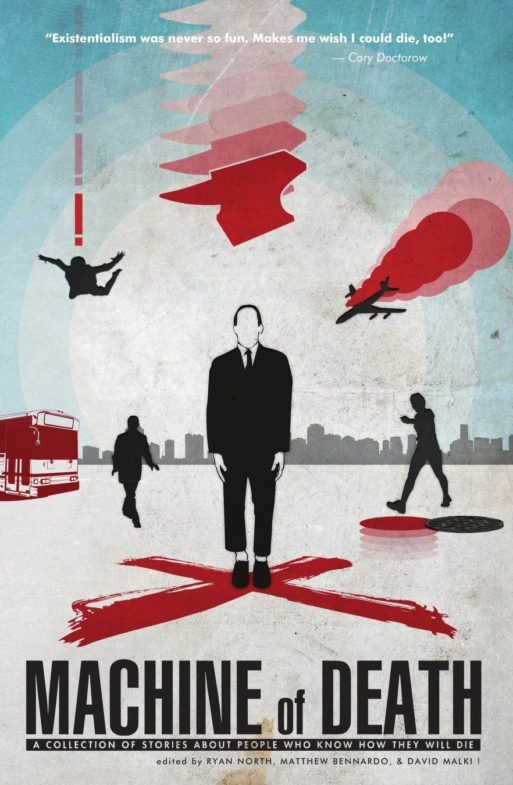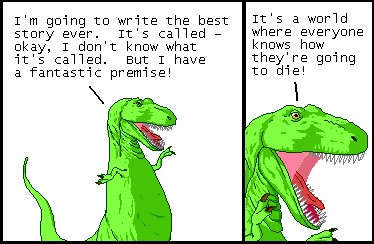 This book is the result of a writing challenge based around a hypothetical situation that was created by the famous webcomic series ‘Dinosaur Comics,’ created by Ryan North. The scenario is simple: what if there was a machine that could tell you exactly the way in which you die? Without a context or a timeline, there is no way to make the information useful. Would you use it if you got the chance? How would it change your life? How would it change the world?
This book is the result of a writing challenge based around a hypothetical situation that was created by the famous webcomic series ‘Dinosaur Comics,’ created by Ryan North. The scenario is simple: what if there was a machine that could tell you exactly the way in which you die? Without a context or a timeline, there is no way to make the information useful. Would you use it if you got the chance? How would it change your life? How would it change the world?
The scenario is simple: what if there was a machine that could tell you exactly the way in which you die?
With a table of contents boasting stories named ‘Flaming Marshmallow,’ ‘Torn Apart and Devoured by Lions’ and ‘Prison Knife Fight,’ the book itself is an enticing read from start to finish. The stories themselves vary in tone from angst, to black humor, to downright hopeful and heartwarming as each writer explores what different characters would do with the knowledge and how culture would change for better or worse.
With a table of contents boasting stories named ‘Flaming Marshmallow,’ ‘Torn Apart and Devoured by Lions’ and ‘Prison Knife Fight,’ the book itself is an enticing read from start to finish.
Perhaps one of my favorites, titled ‘Not Waving But Drowning’, follows a young girl who receives the titular result from the machine of death. Her sentence, as some of you poetry buffs may have guessed, is from a poem written by Stevie Smith. With such a vague result, she is given the option to take the test again, or leave her undoing as a surprise. While, I’ll leave her decision for the book to tell, the story is colored by her kooky grandfather’s belief that “the fear of death, coupled with its unpredictability, is what drives humanity to achieve.” However, in a day and age where the mystery of death can be revealed at the drop of a hat, this belief has become a third-rail philosophy held mostly by those on the fringe of society. Instead, this knowledge drives people into their professions, their relationships and all other aspects of what decisions we make to form a life.

Machine of Death Introduction
While the premise itself may come off as childish, as readers delve deeper into the book, it is nearly impossible not to think of it in terms of your own life. Does having the answer bring us confidence, or does it bring us fear and doubt? In the end, much like real life, it boils down to the person. Even in our own time, there are those who are terminally ill who do get a glimpse into how long they will have until the end. But a person’s life is built upon more than just his or her death. In the end, it is we who decide what to do with that knowledge, if and when it is given.
Related SevenPonds Articles:
- How to Cope with Terminal Illness? An Interview with Michael Engelberg
- Book Review: The Fault in Our Stars by John Green
- Talking to Kids Facing Death

 The Machine of Death by Ryan North
The Machine of Death by Ryan North


 First the Wealth Gap, Now the U.S. Has a Growing Health Gap
First the Wealth Gap, Now the U.S. Has a Growing Health Gap
 How to Comfort A Dying Loved One
How to Comfort A Dying Loved One
 Our Annual Seven Holiday Gifts for Someone Who Is Grieving, 2024 Edition
Our Annual Seven Holiday Gifts for Someone Who Is Grieving, 2024 Edition














